By Ellen Hershberger | Contributor
On Wednesday, Feb. 1, David Anderson, associate professor of marketing, did not show up for his first day of class. Despite being scheduled before the semester began, all of Anderson's spring classes have since been removed from the course registration list. Students enrolled in his marketing courses are now required to earn the credits in alternative ways.
Cole Hession, junior marketing major, was waiting for international marketing to begin when Jody Hirschy, business department chair and professor of marketing, andNancy Gillespie, business department assistant, walked into the classroom to inform the students that Anderson would no longer be teaching the class.
"They didn't tell us one way or the other what exactly was happening," Hession said. "Then they told us we could either take the online version of the class or that we could enroll in another one."
According to Carrie Meyer, director of online learning and instructional technology, transitioning students from Anderson's physical marketing classes to the online versions has been smooth.
"Jody Hirschy met with the students to talk through course options, and almost all affected students chose to take the course online," Meyer said.
Katy Hobbs, marketing and development specialist, is teaching at least one of Anderson's courses-principles of marketing-online. There are 26 business courses offered online through Taylor, sevenof which are related to marketing.
Currently, 46 on-campus students are enrolled in principles of marketing online. On-campus students who want to take an online course during the school year need approval from both the registrar's office and their advisor. Online courses usually cost$400 per credit hour, but with proper permission, an online course can be included in tuition. The feehas been waived for students affected by Anderson's departure.
Students now must adapt to a new class format. Rachel Bouma, junior business management major, was scheduled to take principles of marketing with Anderson this semester. She is now enrolled in the online version.
"I have never taken an online class before, so I guess adapting to a new class style could be a little challenging," Bouma said. "But overall, I appreciate the opportunity to work at my own pace."
Other students, such as junior Ellie Perkins, had some concerns. "This shift to an online class requires a higher degree of organization and responsibility from each of us as students," she said. "Overall, I think it will be a great opportunity and challenge for a new form of learning and personal development."
Anderson had no statement to make on the situation. Prior to his job at Taylor, he held teaching positions at Central Texas College for 18 months and at Seattle Pacific University for 10 months. His job at Taylor lasted 11 months.
Rhoda Sommers, dean of the school of social sciences, education and business, Provost Jeff Moshier, Hirschy and Gillespie also refused to confirm or deny any information regarding Anderson's abrupt departure.
Online versus traditional learning
According to a 2010 study from the U.S. Department of Education, "On average, students in online learning conditions performed modestly better than those receiving face-to-face instruction."
A 2006 study from Merlot's Journal of Online Learning and Teaching found similar results from their survey of 217 students. Students taking online courses reported higher grades and higher quality classes than students in classrooms. Quality included usefulness of materials and textbooks, time spent on courses and overall course difficulty.





